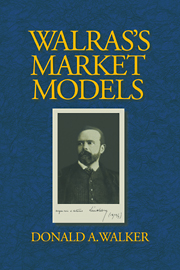Book contents
- Frontmatter
- Contents
- List of figures
- Preface
- Acknowledgments
- Introduction
- Part I The models of the mature phase
- 1 Walras's conception of a competitive market economy
- 2 The mature models: Not a normative scheme
- 3 The mature models of the barter of stocks of commodities
- 4 Institutions and participants in the model of monetary oral pledges markets
- 5 Disequilibrium and equilibrium in the model of monetary oral pledges markets
- 6 The structure of the mature nondurable consumer commodities model
- 7 The equilibrating processes in the mature nondurable consumer commodities model
- 8 The structure of the mature comprehensive model
- 9 The equilibrating processes in the mature comprehensive model
- 10 Walras and his critics on the maximum utility of new capital goods
- 11 The mature models of the money market
- 12 Iteration in the mature model of tatonnement
- 13 The mature model of the behavior of the entrepreneur
- 14 Walras versus Edgeworth on tatonnement processes
- Part II The models of the phase of decline
- References
- Collation of editions of the Eléments
- Index
1 - Walras's conception of a competitive market economy
Published online by Cambridge University Press: 05 May 2010
- Frontmatter
- Contents
- List of figures
- Preface
- Acknowledgments
- Introduction
- Part I The models of the mature phase
- 1 Walras's conception of a competitive market economy
- 2 The mature models: Not a normative scheme
- 3 The mature models of the barter of stocks of commodities
- 4 Institutions and participants in the model of monetary oral pledges markets
- 5 Disequilibrium and equilibrium in the model of monetary oral pledges markets
- 6 The structure of the mature nondurable consumer commodities model
- 7 The equilibrating processes in the mature nondurable consumer commodities model
- 8 The structure of the mature comprehensive model
- 9 The equilibrating processes in the mature comprehensive model
- 10 Walras and his critics on the maximum utility of new capital goods
- 11 The mature models of the money market
- 12 Iteration in the mature model of tatonnement
- 13 The mature model of the behavior of the entrepreneur
- 14 Walras versus Edgeworth on tatonnement processes
- Part II The models of the phase of decline
- References
- Collation of editions of the Eléments
- Index
Summary
This chapter is concerned with Walras's conception of the major features of the behavior of a real market economy. He incorporated them into his mature market models and imprinted them on the character of neoclassical economic analysis.
Introduction
This chapter presents the general characteristics of economic behavior that Walras identified. His objective in the mature phase of his thought was to understand and model the behavior of a freely competitive capitalist market economy. He defined that as one in which there is private ownership of most economic resources and other commodities, and in which commodities of all types and money are exchanged in freely competitive markets. In his Eléments and other writings he elaborated on the properties of such an economy, setting forth his message about them in a number of propositions, models and analyses.
General features
Walras identified three important general features of a market economy. First, he conceived of a market economy as a system in which price competition is strong and widespread but not universal. He recognized that it is absent or very limited in some markets, and developed a theory of monopoly to take account of them. He believed, however, that “free competition is the principal mode of exchange in the real economy, practiced on all markets with more or less precision and therefore with less or more efficiency” (Walras to Ladislaus von Bortkiewicz, February 27, 1891, in 1965, 2, letter 999, pp. 434–35).
- Type
- Chapter
- Information
- Walras's Market Models , pp. 19 - 28Publisher: Cambridge University PressPrint publication year: 1996



